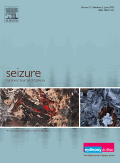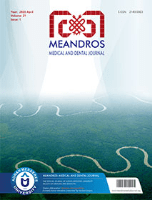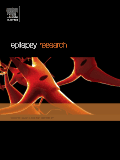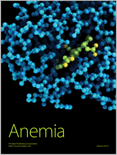
SEIZURE-EUROPEAN JOURNAL OF EPILEPSY
Scope & Guideline
Advancing epilepsy research for a brighter future.
Introduction
Aims and Scopes
- Clinical Research on Epilepsy:
The journal publishes studies that explore clinical aspects of epilepsy, including treatment efficacy, patient outcomes, and management strategies across different populations. - Genetic and Molecular Studies:
There is a strong emphasis on research related to genetic factors associated with epilepsy, including genotype-phenotype correlations and novel gene discoveries that contribute to understanding the underlying mechanisms of epileptic disorders. - Neurophysiology and Imaging Techniques:
Papers often utilize advanced neuroimaging and electrophysiological techniques to investigate brain activity related to seizures, enhancing the understanding of epileptic networks and their dynamics. - Public Health and Epidemiology:
The journal also addresses public health issues related to epilepsy, including epidemiological studies on incidence, prevalence, and mortality rates, as well as the socio-economic impact of the condition. - Interdisciplinary Approaches:
The journal encourages interdisciplinary research that integrates insights from neurology, psychiatry, genetics, and public health to provide a holistic view of epilepsy and its management.
Trending and Emerging
- Precision Medicine and Genetic Testing:
There is a growing focus on personalized medicine approaches, including the use of genetic testing to guide treatment decisions and understand individual patient responses to therapy. - Neuroinflammation and Immune Mechanisms:
Research on the role of neuroinflammatory processes in epilepsy is gaining traction, with studies investigating how systemic inflammation may influence seizure activity and treatment responses. - Digital Health and Telemedicine:
The rise of digital health technologies, including telemedicine and remote monitoring, is becoming a significant area of interest, especially in light of the COVID-19 pandemic and its implications for patient care. - Psychogenic Non-Epileptic Seizures (PNES):
There is an emerging trend in studying the psychological and social aspects of epilepsy, particularly the differentiation and management of PNES, which are often misdiagnosed. - Quality of Life and Patient-Centered Research:
An increasing number of studies are focusing on the quality of life for patients with epilepsy, including the psychosocial impacts of the condition and the effectiveness of interventions aimed at improving overall well-being.
Declining or Waning
- Traditional Pharmacological Approaches:
There is a noticeable decrease in studies focusing solely on traditional anti-seizure medications. As new treatments and management strategies emerge, the emphasis has shifted towards comparative effectiveness and personalized medicine. - Basic Science Research:
Research centered on basic science mechanisms of epilepsy has become less frequent, potentially due to a growing interest in translational studies that directly impact clinical practice. - Generalized Epilepsy Syndromes:
Papers specifically addressing generalized epilepsy syndromes appear to be waning in favor of more detailed investigations into specific genetic or treatment-resistant forms of epilepsy. - Historical Perspectives:
The publication of historical analyses and retrospective studies on the evolution of epilepsy treatment has diminished, indicating a shift towards contemporary and future-focused research. - Surgical Interventions:
While surgical outcomes are still explored, there seems to be less emphasis on traditional surgical techniques, with a growing interest in minimally invasive and novel approaches.
Similar Journals

Meandros Medical and Dental Journal
Fostering collaboration for a healthier tomorrow.Meandros Medical and Dental Journal, published by GALENOS PUBL HOUSE, is an esteemed Open Access journal that has been serving the medical and dental research community since 2000. With its ISSN 2149-9063 and reaching a wide audience globally, this journal focuses on the dissemination of high-quality peer-reviewed research articles, case studies, and reviews that significantly contribute to the fields of medicine and dentistry. Its commitment to open access ensures that researchers, practitioners, and students have unrestricted access to vital findings and innovative techniques that drive advancements in healthcare. While it strives for HIndex and Scopus rankings to elevate its academic stature, the journal continues to play a crucial role in promoting knowledge and fostering collaboration among healthcare professionals dedicated to improving patient care. Located in the heart of Istanbul, Turkey, it stands as a digital bridge for the exchange of groundbreaking research and clinical practices across borders.

BMC Neurology
Driving Progress in Neurology Through Open Access ResearchBMC Neurology is a prominent open-access journal dedicated to advancing the field of neurology and related medical disciplines. Published by BMC since 2001, this journal serves as a vital platform for researchers and clinicians to disseminate their findings in a rapidly evolving area of study. With an impact factor reflecting its importance, BMC Neurology holds a commendable Q2 ranking in both Medicine (miscellaneous) and Clinical Neurology categories, situating it among the top-tier journals in its field. The journal, based in the United Kingdom, covers a wide range of topics pertaining to neurological diseases, treatment methodologies, and advancements in neuroscience. This rigorous publication prioritizes *original research articles, reviews, and clinical studies*, offering researchers and professionals easy access to cutting-edge insights and innovative approaches. As a valuable resource for students, healthcare professionals, and academicians alike, BMC Neurology is committed to fostering knowledge and collaboration in the pursuit of improved neurological health.

EPILEPSY RESEARCH
Transforming research into clinical practice for epilepsy.EPILEPSY RESEARCH is a distinguished journal published by Elsevier, focusing on the dynamic field of neurology with a specific emphasis on epilepsy and related neurological disorders. Since its inception in 1987, the journal has become a vital platform for disseminating cutting-edge research, contributing significantly to the understanding of epileptic conditions and their clinical implications. With an impactful presence in the academic community, EPILEPSY RESEARCH currently holds a 2023 Q2 ranking in both the Neurology and Clinical Neurology categories, reflecting its commitment to high-quality, peer-reviewed content. The journal is indexed in SCOPUS, Ranking #173/400 in Clinical Neurology and #91/192 in Neuroscience, ensuring widespread visibility and academic engagement. Although not an open access publication, it provides critical insights, findings, and reviews that are essential for researchers, clinicians, and students alike, fostering advancements in epilepsy research and treatment. For any inquiries, the journal is based at Radarweg 29, 1043 NX Amsterdam, Netherlands.

Tumori Journal
Fostering Collaboration in the Fight Against Cancer.Tumori Journal is a distinguished publication in the field of oncology, dedicated to advancing the understanding and treatment of cancer since its inception in 1946. Published by SAGE Publications Ltd, this Italian journal serves as a pivotal platform for researchers, clinicians, and academicians to disseminate cutting-edge findings in cancer research and related areas of medicine. With an impressive record of contributions spanning multiple decades, Tumori Journal aims to foster collaboration and dialogue among professionals in the oncology community. Although classified in the Q4 category for Cancer Research and the Q3 category for both Medicine (miscellaneous) and Oncology as of 2023, the journal continues to draw interest with its rigorous peer-review process and commitment to quality. Researchers are encouraged to explore innovative methodologies and share impactful clinical insights through the journal, which also ranks within the top tiers of Scopus metrics for oncology and cancer research domains. With a growing emphasis on accessible research, Tumori Journal remains an essential resource in the continuous fight against cancer.

Anemia
Empowering researchers with open access to vital hematological insights.Anemia is a distinguished open-access journal published by HINDAWI LTD, focusing on the intricate and vital field of hematology and related disciplines. Since its inception in 2010, this journal has been dedicated to advancing our understanding of blood disorders, with a particular emphasis on anemia, through the dissemination of high-quality research that is freely accessible to a global audience. The journal's evolving scope from its founding through 2024 embodies its commitment to include the latest breakthroughs and methodologies in cell biology and hematological research. With its presence in prestigious databases and a tiered ranking that places it in the Q3 category in Hematology and Q4 in Cell Biology as of 2023, Anemia serves as an invaluable resource for researchers, clinicians, and students alike. The journal is indexed with a respectable position in Scopus, ranking 52 out of 137 in Hematology, highlighting its growing influence in the medical and scientific communities. With continued emphasis on open access, Anemia not only fosters collaborative research but also ensures that crucial findings reach those who need them most, enhancing educational outcomes and clinical practices worldwide.

South Asian Journal of Cancer
Empowering voices in oncology and cancer care.South Asian Journal of Cancer, published by GEORG THIEME VERLAG KG, is a pivotal platform for research in the fields of oncology and cancer research. Established in 2012 and operating under an Open Access model, this journal aims to disseminate high-quality, peer-reviewed articles that address crucial developments in cancer treatment, prevention, and research, particularly within the South Asian context. Despite its young history, the journal has been positioned within the Q4 quartile for both Cancer Research and Oncology, and while current Scopus rankings indicate it resides in the lower percentiles, its commitment to amplifying regional voices and research is invaluable. With its headquarters in Stuttgart, Germany, and a global readership, South Asian Journal of Cancer is dedicated to enhancing collaboration among researchers, healthcare professionals, and students, fostering a space for innovative ideas and advancements in cancer care as we progress through to 2024.

EPILEPTIC DISORDERS
Unraveling the Complexities of EpilepsyEpileptic Disorders is a leading journal dedicated to the field of epilepsy research and its clinical implications, published by Wiley. With its ISSN 1294-9361 and E-ISSN 1950-6945, the journal has established a significant presence in the medical and neurological communities, reflecting its commitment to advancing knowledge in the study of epilepsy and related disorders. Covering a broad spectrum of topics, Epileptic Disorders aims to provide a platform for researchers and clinicians to share cutting-edge research findings, clinical insights, and innovative treatments, maintaining a robust presence in Q2 quartiles across multiple categories including Medicine (miscellaneous) and Neurology. The journal, which has been in continuous publication since 1999, also ranks within the 51st and 47th percentiles in the Scopus rankings for Medicine and Neuroscience, respectively, underscoring its relevance and impact in the field. Although not an open-access publication, Epileptic Disorders remains a crucial resource for those seeking to deepen their understanding of epilepsy and improve patient care through research.

Stroke Research and Treatment
Advancing stroke science for better patient outcomes.Stroke Research and Treatment is a premier Open Access journal published by HINDAWI LTD, dedicated to advancing the understanding and management of stroke and related neurological disorders. Since its inception in 2010, this journal has established itself as a valuable resource for researchers and clinicians in the field of neurology, providing a platform for high-quality, peer-reviewed articles that aim to improve patient outcomes and stimulate clinical practice innovations. With a 2023 Scopus ranking placing it in the Q3 category and a percentile ranking of 44th in clinical neurology, the journal is positioned to influence the ongoing discourse in stroke research. Stroke Research and Treatment embraces a global audience, with its editorial operations based in London, England. The journal's commitment to open access ensures that its content is freely available to all, promoting extensive dissemination and engagement in this critical field of study. Researchers, professionals, and students are encouraged to contribute their findings to this dynamic journal, fostering collaboration and knowledge sharing in the ongoing fight against stroke.

Ideggyogyaszati Szemle-Clinical Neuroscience
Fostering Innovation in Neurological ResearchIdeggyogyaszati Szemle-Clinical Neuroscience, an esteemed publication under the auspices of LITERATURA MEDICA, serves as a pivotal platform in the field of neurology and clinical neuroscience. Established in Hungary, this journal has been committed to advancing the understanding of neurological disorders and treatments since its inception. With its ISSN 0019-1442 and E-ISSN 2498-6208, it provides a unique local perspective alongside valuable contributions to the global discourse in neuroscience. Despite earning a Q4 quartile ranking in both Neurology and Clinical Neurology, the journal remains dedicated to publishing high-quality research that contributes to the scientific community's collective knowledge. Its coverage spans significant converged years from 1954 to 1985 and now continues through 2024, reflecting a rich historical foundation. Recognizing the importance of open access, the journal strives to enhance accessibility, albeit currently lacking a formal open-access model. Researchers, professionals, and students in the field will find in Ideggyogyaszati Szemle a resource vital for keeping abreast of emerging trends and findings in neurological science.

NEUROPEDIATRICS
Empowering clinicians with cutting-edge insights in pediatric care.NEUROPEDIATRICS is a prominent academic journal published by GEORG THIEME VERLAG KG, dedicated to advancing the understanding and treatment of neurological disorders in children. Established in 1980, this journal has consistently provided a platform for innovative research and clinical practice in the fields of pediatrics and neurology, culminating in its recognition across various rankings; it holds a Q2 rating in Pediatrics, Perinatology and Child Health, and Q3 in both Medicine (miscellaneous) and Neurology (clinical) as of 2023. While NEUROPEDIATRICS is not an open access journal, it remains a crucial resource for researchers, clinicians, and students who seek cutting-edge insights and evidence-based practices in the management of pediatric neurological issues. As a result, NEUROPEDIATRICS plays an indispensable role in shaping future research directions and improving health outcomes in this vital field.